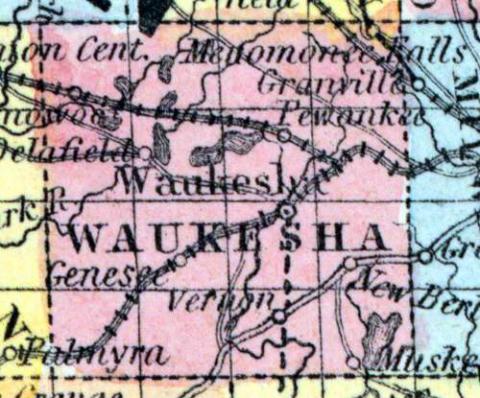WAUKESHA, formerly PRAIRIEVILLE, a flourishing post-village, capital of Waukesha county, Wisconsin, on the Pishtaka or Fox river, and on the Milwaukee and Mississippi railroad, 18 miles W. from Milwaukee, and 60 miles E. from Madison. Plank-roads have been laid in several directions from the village. These facilities for trade, together with the water-power of the river, and the fertility of the adjacent land, render this a place of active business. It is situated at the extremity of a beautiful prairie. The court house and jail are built of Waukesha limestone, a superior article, quarried in the immediate vicinity. There are 6 churches, an academy, I or 2 newspaper offices, and an institution styled Carroll College, incorporated in 1846. The village contains 8 dry-goods stores, over 12 other stores, an iron foundry, a machine shop, and car factory, 4 hotels, a flouring mill, a carding mill, and 4 saddle and harness shops. Incorporated in 1852. Population in 1853 estimated at 4000. (Baldwin's New and Complete Gazetteer of the United States..., 1854)
WAUKESHA, P. V. and C. H., is located on section 3, town 6, of range 19 E., in town and county of the same name, 18 miles west of Milwaukee and 70 east of Madison. It is situated on Fox river, (Pishtaka), near the head of a beautiful prairie from which it derived its former name of Prairieville. It is situated on the Milwaukee and Mississippi railroad. This place was incorporated in 1852, and has about 1,500 inhabitants, 1 flouring, 1 saw, and 1 carding mill, 1 iron foundry, 1 machine and car shop, 3 blacksmiths, 2 coopers, 2 wheelwrights, 6 shoemakers, 2 cabinet makers, and 4 saddle and harness makers, 4 hotels, 8 dry good, 2 drug, 3 hardware and 7 grocery Btores, 1 printing office, 6 churches, 1 academy, and is the seat of Carroll College, incorporated in 1846. It has a stone courthouse and jail built of the celebrated Waukesha limestone, and the several societies of Masons, S. of T., I. O. of O. F., D. of T., and B. of U. (John Warren Hunt, Wisconsin Gazetteer..., Madison, 1853)

